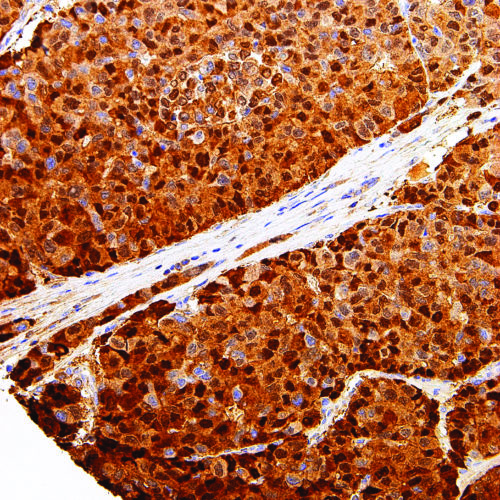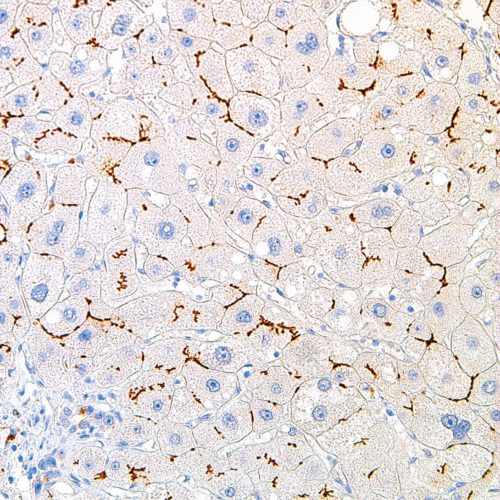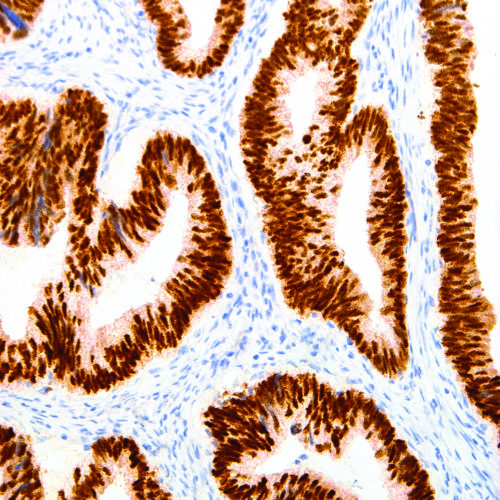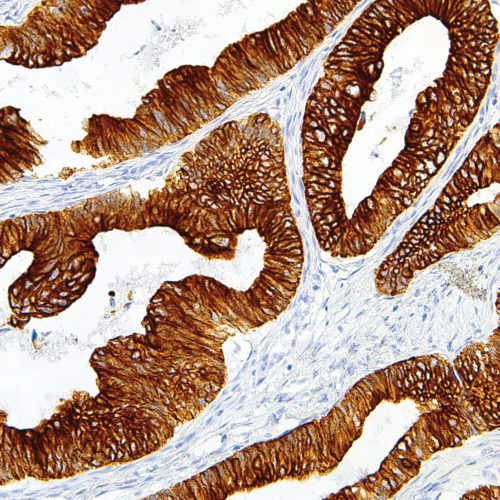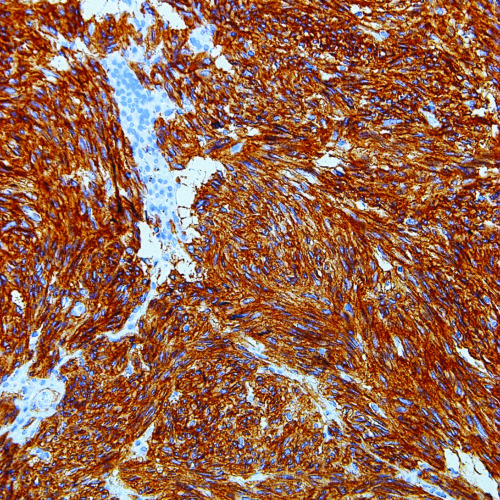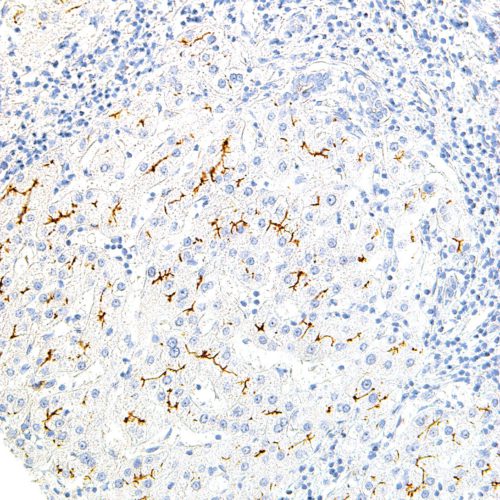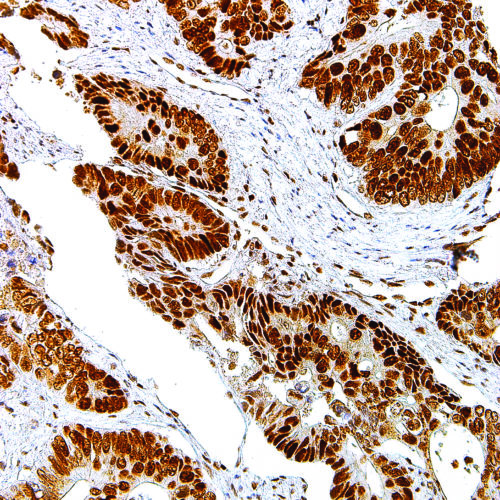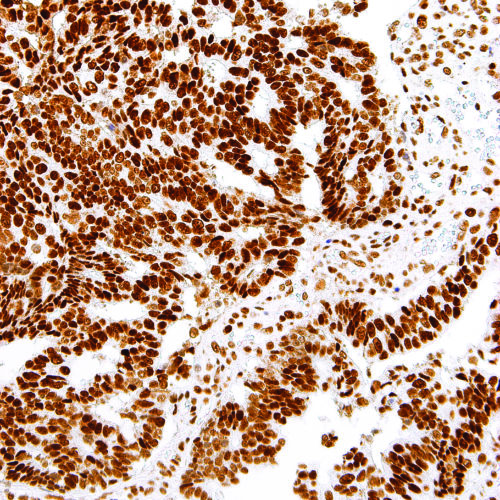High quality products to support Pathologists and Biological and Environmental Scientists
GeneAb™ Arginase-1
$80.00 – $335.00Arginase-1, encoded by the ARG1 gene, is a cytosolic metalloenzyme expressed predominantly in hepatocytes which plays a key role in the urea cycle by catalyzing the hydrolysis of arginine to ornithine and urea. Argininemia is an inherited autosomal recessive disorder characterized by a buildup of arginine and ammonia in the blood. Anti-Arginase-1 is highly specific for hepatocytes, and is therefore a sensitive and specific marker of benign and malignant hepatic tumors.
GeneAb™ BSEP
$145.00 – $670.00Bile Salt Export Pump (BSEP) is a member of the ATP-binding cassette (ABC) transporters, which mediates the transport of bile acid, taurocholate and other cholate conjugates across the hepatocyte canalicular membrane into the canaliculus. BSEP is associated with progressive familial intrahepatic cholestasis type 2 (PFIC2) and benign recurrent intrahepatic cholestasis type 2 (BRIC2). PFIC2 caused by mutations in the BSEP gene increases the risk of hepatocellular carcinoma in early life.
GeneAb™ CDX-2
$85.00 – $635.00CDX-2 is a caudal-related homeobox transcription factor that is expressed by intestinal epithelial cells. CDX-2 is a useful marker for gastrointestinal carcinoma, and for determining the origin of gastrointestinal metastatic adenocarcinoma and carcinoids. Anti-CDX-2 is used for differentiating lung and metastatic colorectal adenocarcinoma, however mucinous ovarian carcinoma also react positively with Anti-CDX-2, thereby limiting the ability to differentiate from metastatic colorectal adenocarcinoma.
GeneAb™ Cytokeratin 18
$60.00 – $240.00Cytokeratin 18 (CK18) is present in simple, glandular, and transitional epithelial cells, but is absent in stratified epithelial cells. CK18 usually multimerizes with Cytokeratin 8, and Anti-Cytokeratin 18 is useful for detecting adenocarcinomas of simple and glandular epithelium origin, as well as poorly differentiated squamous carcinoma cells.
GeneAb™ DOG1
$50.00 – $195.00DOG1, also known as Discovered on GIST-1, is a marker that highly specific for gastrointestinal stromal tumor (GIST). Anti-DOG1 is extremely sensitive for the detection of GIST and its diagnosis. Although some GIST stain weakly for c-kit, DOG1 is expressed in the vast majority of GIST cases. Reports have also indicated DOG1 as a marker for salivary acinar and intercalated duct differentiation.
GeneAb™ MDR3
$210.00 – $980.00Multidrug Resistance 3 (MDR3), also known as ATP Binding Cassette Subfamily B Member 4 (ABCB4), is a membrane-associated protein belonging to the superfamily of ATP-binding cassette transporters. MDR3 is an energy-dependent phospholipid efflux translocator that mediates the translocation of phosphatidylcholine across the canalicular membrane of the hepatocyte, and also acts as a positive regulator of biliary lipid secretion. Defects in MDR3 are associated with progressive familial intrahepatic cholestasis type 3 and gallbladder disease type 1. Co-overexpression of MDR3 and MRP1 has been documented as correlating with blastemal subtype and high-risk prognosis of Wilms’ tumor patients.
GeneAb™ MLH1
$95.00 – $455.00MutL Homolog 1 (MLH1) is a protein involved in the mismatch-repair pathway. This protein is commonly associated with hereditary non-polyposis colorectal cancer, as the MLH1 gene is frequently mutated in patients with this cancer. Studies have shown MLH1 to be deficient in a high percentage of patients with microsatellite instability, as well as endometrial and ovarian cancers. Use of Anti-MLH1 is optimized when paired in an IHC panel with MSH6, MSH2, and PMS2. Anti-MLH1 is useful in the detection of MLH1 in a number of normal and neoplastic tissues, and for identifying a loss of MLH1 in tumors that are microsatellite-unstable.
GeneAb™ MSH2
$60.00 – $250.00MutS Homolog 2 (MSH2) is a protein involved in the mismatch-repair pathway. This protein is commonly associated with hereditary non-polyposis colorectal cancer, and mutations in this gene are correlated with the development of sporadic colorectal carcinoma. Expression levels of MSH2 are abnormally low in a high percentage of patients with microsatellite instability, as well as endometrial and ovarian cancers. Use of Anti-MSH2 is optimized when paired in an IHC panel with antibodies against MSH6, MLH1, and PMS2. Reports have shown Anti-MSH2 to be useful in the detection of the protein in a number of normal and neoplastic tissues, and for identifying a loss of MSH2 in tumors that are microsatellite-unstable.
